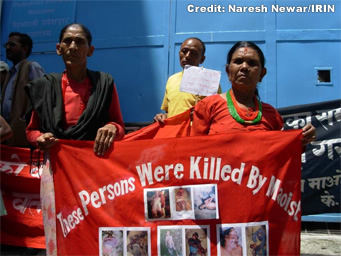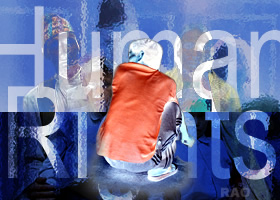|
Nepal
in Crisis 2006: Human Rights
|
|
Displaced
families live in fear despite peace process
|
 |
KATHMANDU,
22 August 2006 (IRIN)
Many
internally displaced persons (IDPs) in Nepal still feel threatened by Maoist
insurgents and have not been able to return to their homes despite the
peace process.
Dor
Bahadur Karki, an IDP who fled his remote village in Sindhuli district,
200 km west of the capital, Kathmandu, after Maoists threatened to kill
him unless he paid them a large sum of money, said the government was not
doing enough.
"We
will have no choice but to take up violence in the streets to make our
voices heard if our problems are not solved soon," Karki said.
 |
| <<
Demonstators outside the OHCHR called for greater recognition of their
plight
A
group of IDPs have been protesting peacefully in Kathmandu for the past
month to pressure the interim government and the Maoists to provide them
safe passage and financial security while returning to their homes.
More
than 100 IDPs also staged a demonstration in front of the United Nations
Office of the High Commission for Human Rights (OHCHR) to get international
recognition of their plight. |
|
The
Internal
Displacement Monitoring Centre (IDMC), the leading international body
on IDP issues, said the decade-long armed conflict between the Maoists
and government had displaced between 100,000 and 200,000 Nepalese people.
More
than 12,000 people have died in the decade-long conflict between Maoist
rebels and the government
A
ceasefire was agreed in April when the new interim government, a coalition
of the seven national parties, was formed following mass protests that
ended King Gyanendra's direct rule on 24 April.
The
Maoists have already called on the IDPs to return home, assuring them safe
passage and the return of their seized properties.
But
the IDPs claim that the Maoists have not kept their promises.
top
 |
|
| A
local human rights watchdog claims that a quarter of those deaths The Association
of Sufferers of the Maoists, Nepal (ASMAN), a group formed by 20,000
IDPs, said that cadres in the villages had refused to return the lands
and houses seized when people refused to join, pay donations or support
them.
"The
Maoists are still doing injustices to a lot of poor villagers. They still
intimidate us, ask for donations, torture and even kill people who don't
support their party or do as they ask," Dharma Raj Neupane, ASMAN's president,
maintained. |
|
A
large number of IDPs had not been able to return home, with the government
and Maoists failing to do anything to reintegrate them into their village
communities, Neupane added.
Less
than 1,000 IDPs had returned home with the help of human rights organisations,
and a large number were still living in difficult conditions in the country's
towns and cities, Insec, a prominent rights group, said.
"We
are afraid that the Maoists will kill or hurt us if we approach their leaders
to plead for help. We don't have the courage to face them," Sita Pariyar,
a 16-year-old married mother-of-one, said.
She
and her family fled their village in Kanchanpur, 700 km west of Kathmandu,
after the rebels shot Sita's mother for refusing to let them take her to
be a Maoist soldier. Her mother died a few months later because they had
no money to buy treatment for her wounds.
Maoist
leaders in the capital said that they were studying how many people had
been displaced, stating efforts were under way to return properties to
"genuinely displaced families".
Credit
IRIN 2006
Copyright
© UN Office for the Coordination of Humanitarian Affairs 2006
[
This report does not necessarily reflect the views of the United Nations]
Integrated
Regional Information Networks (IRIN), part of the UN Office for the Coordination
of Humanitarian Affairs (OCHA).
top

|






